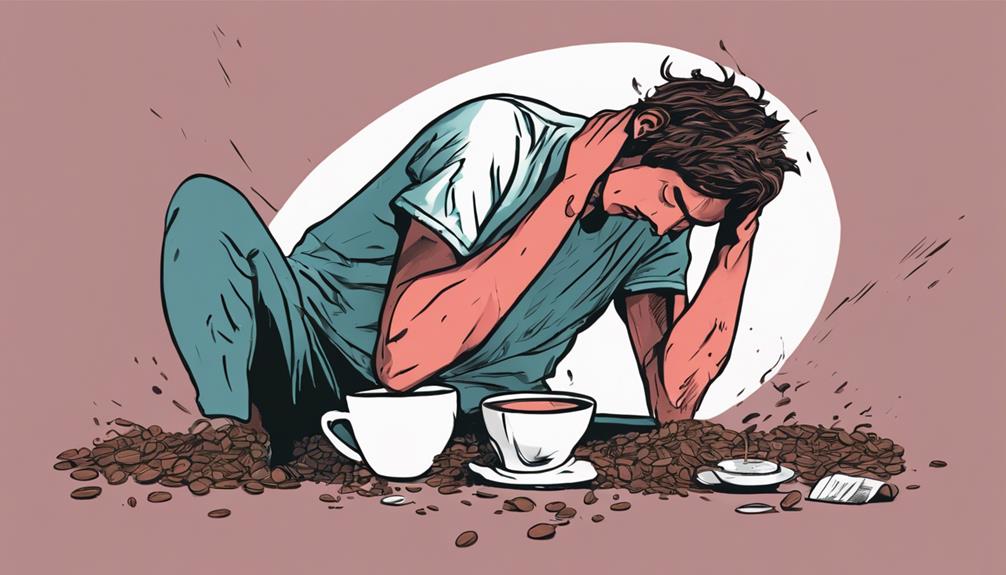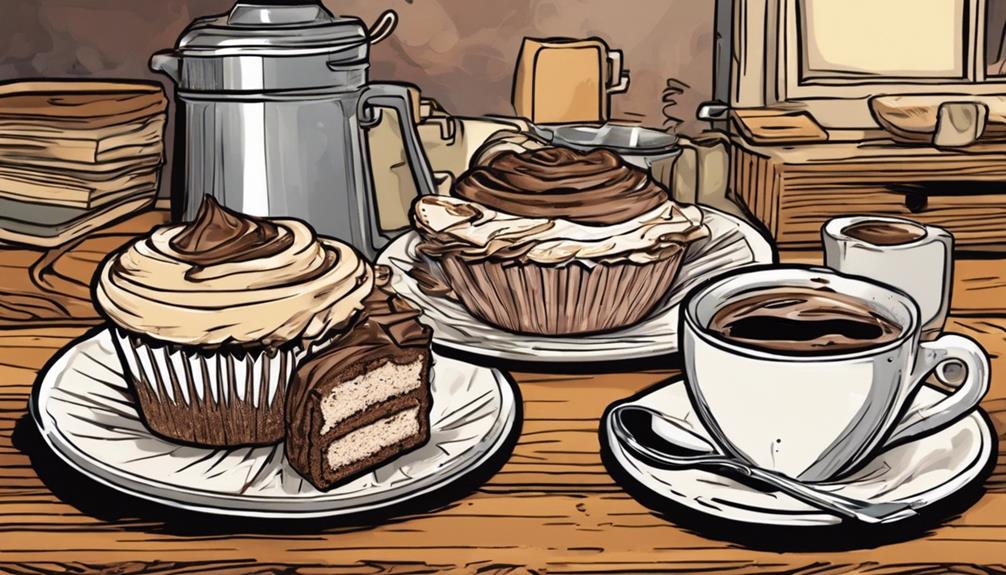To avoid coffee-induced headaches, it is important to carefully manage your caffeine intake. Gradually decreasing your coffee consumption can help prevent withdrawal headaches. Ensure you stay hydrated, relax, and get enough sleep to alleviate symptoms. Monitor your daily caffeine intake and look for patterns in your headache diary. Explore the connection between caffeine and headaches, and make educated decisions to prevent headaches. Consider alternatives to caffeine and make adjustments to your routine. By moderating your caffeine intake, you can have a day without headaches. Additional helpful tips can be found just a scroll away.
Key Takeaways
- Gradually reduce coffee intake to prevent withdrawal headaches.
- Stay hydrated to alleviate discomfort during caffeine reduction.
- Monitor caffeine consumption to identify headache triggers.
- Consider alternative beverages to reduce coffee intake.
- Seek healthcare advice for personalized support in managing caffeine headaches.
Caffeine Withdrawal Symptoms
Experiencing caffeine withdrawal symptoms can be challenging, but understanding their nature can help you navigate this process effectively.
One common symptom is the caffeine withdrawal headache, which often manifests within 12-24 hours after reducing or stopping caffeine consumption. To minimize the severity of these headaches and other withdrawal symptoms, gradually decreasing your caffeine intake is recommended.
Hydrating adequately, practicing stress-reduction techniques, and ensuring you get enough sleep can also help manage these symptoms effectively.
It's pivotal to remember that consulting a healthcare professional for personalized advice on caffeine withdrawal is advisable for tailored support.
Managing Caffeine Consumption

To effectively manage your caffeine consumption and reduce the risk of developing headaches, it's essential to monitor your daily intake levels closely. Here are three practical tips to help you in managing caffeine consumption:
- Monitor Your Intake: Keep a close eye on how much caffeine you consume daily. This can help you understand if there's a correlation between your caffeine intake and headaches.
- Track Patterns: Maintain a headache diary to track patterns and possible triggers related to your caffeine consumption. Identifying these patterns can assist in making informed decisions about your caffeine intake.
- Gradual Reduction: If you notice frequent headaches, consider gradually reducing your caffeine intake. This can help determine if there's a connection between your caffeine consumption and headaches.
Mayo Clinic Health System Recommendations

Consider integrating the Mayo Clinic Health System recommendations into your routine to effectively manage caffeine-related headaches. Begin by monitoring your caffeine intake and its impact on headaches.
Maintaining a headache diary can help track patterns and frequency of headaches, assisting in identifying triggers. If you're experiencing frequent headaches, gradually reducing your caffeine intake may be advantageous.
Seeking advice from a healthcare professional for personalized guidance on managing caffeine-related headaches is crucial. Moreover, explore alternative headache management strategies while adjusting your caffeine consumption.
By being mindful of your caffeine intake and its effects on your headaches, you can take proactive measures to lessen the chances of experiencing caffeine withdrawal headaches.
Keep in mind, controlling caffeine intake is a fundamental aspect in preventing and alleviating caffeine-related headaches.
How To Quit Caffeine

To successfully quit caffeine, start by gradually reducing your intake to minimize withdrawal symptoms.
Remember to stay hydrated to help alleviate any discomfort during this process.
Seek guidance from a healthcare provider for personalized support and advice tailored to your specific needs.
Quitting Gradually for Success
Gradually diminishing your caffeine intake can greatly enhance your chances of successfully quitting and minimizing withdrawal symptoms. When you decide to cut back on caffeine, taking it slow is key.
Here are three essential tips to help you ease into a caffeine-free lifestyle:
- Plan a gradual reduction: Start by replacing one caffeinated drink with a decaffeinated option each day. Slowly decrease your intake to give your body time to adjust without causing intense withdrawal symptoms.
- Stay hydrated: Drinking plenty of water can help alleviate headache pain and fatigue during the shift. Hydration is vital for supporting your body as it adapts to lower caffeine levels.
- Seek professional guidance: Consulting healthcare providers or nutritionists for personalized advice can offer tailored strategies to quit caffeine effectively. They can provide support and recommendations to make the process smoother and more manageable.
Hydration for Withdrawal Relief
Staying well-hydrated is crucial for alleviating withdrawal symptoms, particularly headaches, when quitting caffeine. Dehydration can worsen withdrawal effects, such as headaches, highlighting the significance of adequate fluid intake.
Opting for water is your best choice to stay hydrated during caffeine withdrawal since it helps in flushing out toxins and maintaining essential bodily functions. By prioritizing hydration, you can potentially reduce the intensity and duration of caffeine withdrawal headaches, leading to a smoother shift.
Consistently drinking water throughout the day plays a pivotal role in minimizing the discomfort associated with caffeine withdrawal headaches. Remember, hydration is essential in supporting your body through this process, so keep that water bottle nearby to help ease the impact of caffeine withdrawal on your system.
Seeking Medical Guidance
Before embarking on your caffeine quitting journey, it's wise to consult with a healthcare provider to guarantee a safe and customized approach that addresses potential withdrawal symptoms effectively.
Here are three key reasons why seeking medical guidance when quitting caffeine is crucial:
- Tailored Strategies: A healthcare provider can collaborate with you to develop a gradual caffeine reduction plan that fits your individual needs, minimizing the risk of withdrawal headaches and other side effects.
- Support and Alternate Methods: Healthcare professionals can provide valuable support and recommend alternate methods to manage headaches during the caffeine quitting process, ensuring a smoother shift.
- Secure and Efficient Approach: Seeking medical guidance ensures that you have a secure and efficient approach to quitting caffeine. Your healthcare provider can address any concerns or challenges that may arise, offering resources, suggestions, and monitoring to help you successfully shift away from caffeine consumption.
Caffeine Alternatives and Swaps

Consider incorporating tea as a cozy morning alternative to coffee, offering a variety of flavors and caffeine levels. Tea provides a soothing start to your day with options like black, green, or herbal teas, each containing different caffeine levels to suit your preference.
If you're looking to replace soda, sugar-free seltzer can be a revitalizing choice without the caffeine kick.
For social gatherings, opt for unsweetened herbal teas in vibrant hues to enjoy a caffeine-free beverage while socializing.
Exploring a range of caffeine-free beverages like herbal infusions or fruit-infused water can keep you hydrated without the stimulant effects of caffeine.
To gradually reduce your caffeine intake and potentially prevent headaches, integrate decaf options into your daily routine. By making these simple swaps, you can enjoy a variety of beverages while minimizing your reliance on caffeine.
Effects and Recommendations on Caffeine Consumption

Exceeding the recommended daily caffeine intake can result in detrimental side effects, particularly when consuming more than 300mg on a regular basis.
To avoid potential issues related to caffeine consumption, consider the following recommendations:
- Monitor Your Caffeine Intake: Keep track of your daily caffeine consumption from all sources, including coffee, tea, energy drinks, and sodas. Being aware of how much caffeine you're consuming can help you stay within safe limits.
- Stay Hydrated: Caffeine is a diuretic, which can lead to dehydration. Make sure to drink plenty of water throughout the day to counteract the dehydrating effects of caffeine.
- Gradually Reduce Caffeine Intake: If you're looking to decrease your caffeine consumption, do it gradually to avoid withdrawal symptoms like headache pain, fatigue, and irritability. Slowly cutting back can help your body adjust more comfortably.
Strategies for Quitting Caffeine

Start by conducting a caffeine audit to identify all sources of caffeine in your diet. Different beverages and foods have varying amounts of caffeine, so being mindful of your intake is essential. To quit caffeine successfully, consider slowly reducing your intake to minimize withdrawal symptoms and prevent caffeine headaches. Staying hydrated with water is vital during this process to combat withdrawal symptoms and reduce your reliance on caffeine. Integrate decaf options gradually to help lower your overall caffeine consumption.
| Caffeine Audit | Slow Reduction | Stay Hydrated |
|---|---|---|
| Identify all sources | Gradually decrease | Drink plenty of |
| of caffeine | caffeine intake | water |
| in your diet | to minimize | to combat |
| withdrawal symptoms | withdrawal symptoms | |
| and prevent headaches | and reduce reliance |
Brand and Product Evaluation

Evaluate brands and products for their ingredients, composition, and adherence to industry standards to guarantee credibility and reliability.
When evaluating products related to caffeine and headaches, consider the following:
- Ingredients: Look for products that contain ingredients known to alleviate headache symptoms, such as caffeine in pain relievers like Excedrin.
- Composition: Check the formulation of the product to confirm it meets your needs and preferences, especially when dealing with caffeine withdrawal headaches.
- Adherence to Industry Standards: Opt for brands that follow industry best practices and have a reputation for producing effective pain relief products without exacerbating headaches.
Caffeine as a Headache Trigger

When considering the impact of caffeine on headaches, it's vital to understand how regular consumption and withdrawal can trigger headache symptoms.
Regular caffeine consumption can lead to dependence, as the body becomes reliant on its vasoconstrictive effects. Caffeine's ability to narrow blood vessels around the brain can initially provide relief from headaches. However, when caffeine intake is suddenly stopped, blood vessels dilate, increasing blood flow and potentially triggering headaches.
Caffeine withdrawal headaches may persist for a couple of weeks as the body adjusts to the absence of caffeine. It's essential to monitor caffeine intake and its impact on headaches to effectively manage caffeine-related headaches.
Being mindful of your caffeine consumption and gradually reducing intake if needed can help prevent the onset of withdrawal headaches. Understanding how caffeine affects your body and being proactive in managing its consumption can go a long way in avoiding caffeine-induced headaches.
Frequently Asked Questions
Why Is Caffeine Giving Me Headaches?
Caffeine might be giving you headaches because of caffeine withdrawal, leading to increased blood flow and nerve pressure. Regular consumption can create dependency, causing adjustments when caffeine is removed. Monitoring intake and gradual reduction can help.
Why Do I Get a Headache When I Haven't Had My Coffee?
When you skip your coffee, your body may react with a headache due to caffeine withdrawal. Your blood vessels dilate without caffeine's constriction, causing increased blood flow and potential headaches. Gradually reducing caffeine can help prevent this.
How Long Do Caffeine Withdrawal Headaches Last?
Caffeine withdrawal headaches typically last around 2-9 days after stopping caffeine consumption. The duration varies based on sensitivity and intake levels. Symptoms peak within 24-48 hours, then improve gradually. Hydration, rest, and gradual caffeine reduction can help.
What Is the Best Source of Caffeine for Headache?
For headache relief, green tea with lower caffeine content, dark chocolate as a milder option, matcha tea for sustained release, or herbal teas like peppermint and ginger offer caffeine-free alternatives. Decaf coffee may also help.
Conclusion
So, now you know how to avoid those pesky coffee headaches! Just remember, cutting back on caffeine doesn't have to be a challenging task. In fact, you can easily switch to decaf or explore alternative beverages like herbal tea. Additionally, staying hydrated and getting enough sleep can also help reduce the risk of coffee-induced headaches. And don’t forget to avoid coffee heartburn by not consuming large amounts of acidic or spicy foods along with your coffee. With these simple changes, you can enjoy your cup of coffee without the discomfort of headaches or heartburn.
With a little determination and some smart swaps, you can kick the caffeine habit and say goodbye to those pounding headaches for good. Trust me, the relief you'll feel will be like a cool breeze on a scorching hot day.
So what're you waiting for? Start making those changes today!









